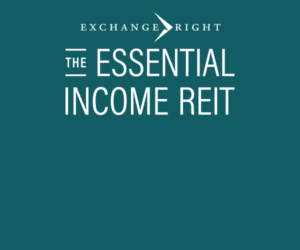Is Owning A House Enough Real Estate?
April 20, 2022 | Erik Hayden | Urban Catalyst
This is a question we hear a lot. For many people, their house is their single biggest investment, especially in California where even a modest bungalow can be a multi-million dollar commitment. Some people own two houses so their exposure to residential real estate is even greater. Given all that, they ask, why invest in an office or apartment building?
The short answer is that while both single family homes and commercial properties are definitely real estate, their return characteristics are very different. There are potential advantages to owning commercial real estate (CRE) that you don’t get from owning a home.
Income is big one. A primary residence is a place to live but is not generally a source of income. Commercial real estate ownership often has an income component. For example, the NCREIF NPI (National Property Index) had a 6.15% return in the fourth quarter of 2021 including 1.03% from income. For 3Q 2021 the return was 5.23% including 1.05% in income. (The NPI reflects investment performance for 9,919 commercial properties, totaling $834 billion of market value. The 6.15% return was unleveraged for what is primarily “core” real estate held by institutional investors.)
Geographic diversification is another potential benefit. Most people only live in one place at a time and their property value is determined in large part by their location. CRE allows you to gain exposure to different areas of the country. Some may be more urban. Some may be home to rapidly expanding segments of the economy. In our case, we are focused on downtown San Jose, recently named the #1 city in the U.S. for attracting innovation-oriented industries by the real estate services firm JLL.
Diversification by property type is another potential benefit. There are other kinds of real estate in addition to residential, each with its own return characteristics. In our case projects include retail, office, hotel, and senior and student housing, in addition to multifamily.
Investing through Opportunity Zone (OZ) Fund like ours offer a fourth benefit: the potential to defer capital gains taxes on the sale of a business, company stock, or other real estate until the investment is sold or exchanged, or December 31, 2026, whichever comes first. If you hold your investment in a qualified OZ fund for at least 10 years, you may be able to permanently exclude from taxes any gains resulting from that investment when it is sold or exchanged.
Home ownership is a part of the American Dream but it’s not the only way to own real estate. To learn more about investing into CRE with Urban Catalyst, go here.
About Urban Catalyst
Urban Catalyst Opportunity Fund LLC (“Urban Catalyst”) is a real estate development Fund focused on properties located in the downtown San Jose Opportunity Zone, in the heart of Silicon Valley.
Important Disclosures
The contents of this communication: (i) do not constitute an offer of securities or a solicitation of an offer to buy securities, (ii) offers can be made only by the confidential Private Placement Memorandum (the “PPM”) which is available upon request, (iii) do not and cannot replace the PPM and is qualified in its entirety by the PPM, and (iv) may not be relied upon in making an investment decision related to any investment offering by an issuer, or any affiliate, or partner thereof (“Issuer”).
All potential investors must read the PPM and no person may invest without acknowledging receipt and complete review of the PPM.
With respect to any performance levels outlined herein, these do not constitute a promise of performance, nor is there any assurance that the investment objectives of any program will be attained. All investments carry the risk of loss of some or all of the principal invested. Assumptions are more fully outlined in the Offering Documents/ PPM for the respective offering. Consult the PPM for investment conditions, risk factors, minimum requirements, fees and expenses and other pertinent information with respect to any investment.
These investment opportunities have not been registered under the Securities Act of 1933 and are being offered pursuant to an exemption therefrom and from applicable state securities laws. All offerings are intended only for accredited investors unless otherwise specified.
Past performance are no guarantee of future results. All information is subject to change. You should always consult a tax professional prior to investing. Investment offerings and investment decisions may only be made on the basis of a confidential private placement memorandum issued by Issuer, or one of its partner/issuers. Issuer does not warrant the accuracy or completeness of the information contained herein. Thank you for your cooperation.
Real Estate Risk Disclosure:
– There is no guarantee that any strategy will be successful or achieve investment objectives including, among other things, profits, distributions, tax benefits, exit strategy, etc.;
– Potential for property value loss – All real estate investments have the potential to lose value during the life of the investments;
– Change of tax status – The income stream and depreciation schedule for any investment property may affect the property owner’s income bracket and/or tax status. An unfavorable tax ruling may cancel deferral of capital gains and result in immediate tax liabilities;
– Potential for foreclosure – All financed real estate investments have potential for foreclosure;
– Illiquidity – These assets are commonly offered through private placement offerings and are illiquid securities. There is no secondary market for these investments.
– Reduction or Elimination of Monthly Cash Flow Distributions – Like any investment in real estate, if a property unexpectedly loses tenants or sustains substantial damage, there is potential for suspension of cash flow distributions;
– Impact of fees/expenses – Costs associated with the transaction may impact investors’ returns and may outweigh the tax benefits
– Stated tax benefits – Any stated tax benefits are not guaranteed and are subject to changes in the tax code. Speak to your tax professional prior to investing.
Opportunity Zone Disclosures
– Investing in opportunity zones is speculative. Opportunity zones are newly formed entities with no operating history. There is no assurance of investment return, property appreciation, or profits. The ability to resell the fund’s underlying investment properties or businesses is not guaranteed. Investing in opportunity zone funds may involve a higher level of risk than investing in other established real estate offerings.
– Long-term investment. Opportunity zone funds have illiquid underlying investments that may not be easy to sell and the return of capital and realization of gains, if any, from an investment will generally occur only upon the partial or complete disposition or refinancing of such investments.
– Limited secondary market for redemption. Although secondary markets may provide a liquidity option in limited circumstances, the amount you will receive typically is discounted to current valuations.
– Difficult valuation assessment. The portfolio holdings in opportunity zone funds may be difficult to value because financial markets or exchanges do not usually quote or trade the holdings. As such, market prices for most of a fund’s holdings will not be readily available.
– Capital call default consequences. Meeting capital calls to provide managers with the pledged capital is a contractual obligation of each investor. Failure to meet this requirement in a timely manner could elicit significant adverse consequences, including, without limitation, the forfeiture of your interest in the fund.
– Opportunity zone funds may use leverage in connection with certain investments or participate in investments with highly leveraged capital structures. Leverage involves a high degree of financial risk and may increase the exposure of such investments to factors such as rising interest rates, downturns in the economy or deterioration in the condition of the assets underlying such investments.
– Unregistered investment. As with other unregistered investments, the regulatory protections of the Investment Company Act of 1940 are not available with unregistered securities.
– It is possible, due to tax, regulatory, or investment decisions, that a fund, or its investors, are unable realize any tax benefits. You should evaluate the merits of the underlying investment and not solely invest in an opportunity zone fund for any potential tax advantage.











